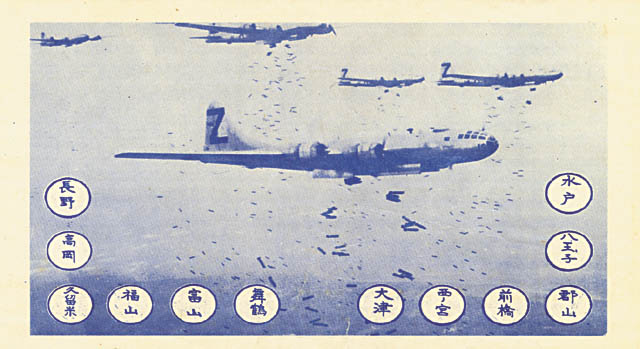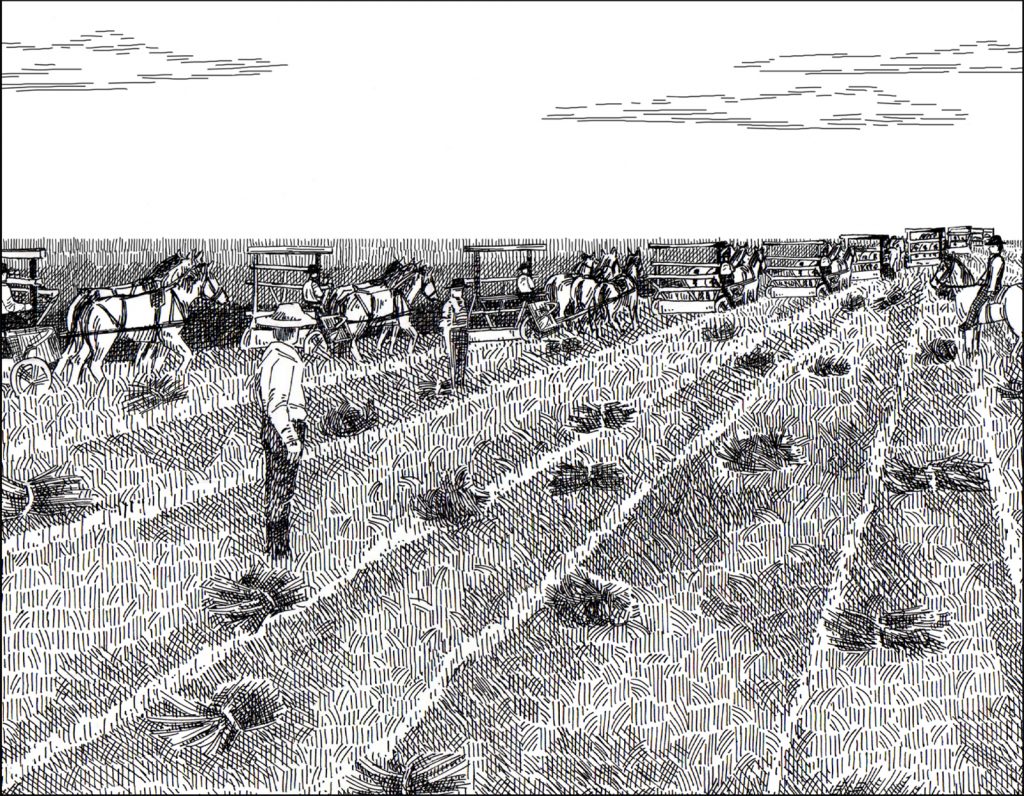“Walter Kaplan Reads John Hersey’s Hiroshima, March 1947,” a short story by Peter Orner, appeared in the Summer 1999 issue of MQR.
*
He sits in a creased maroon leather recliner with his feet flat on the rug. The book is slender, nearly weightless in his hands. The door of his tiny study is closed. He reads by the light of a lamp which sits on a dark oak desk now cluttered with a few opened books, face down. Otherwise the desk is tidy with a lone paperweight in the shape of a terrier (the same one he once tried to glue to the hood of his Ford in a dig at Cy Friedman and his Cadillac DeVille), a heavy duty stapler, a leather-bordered blotter, and a small framed photograph of his daughter as a baby. His wife Sally gabs in the backyard with Erma Friedman—he can see them out the room’s single window—the ladies stand, wavy dresses in the gust, by the huge boulder that looms oddly between the two houses. It is late afternoon, Saturday. He reads. By page 13 the flat nonchalant terrorless prose begins its scream. Everything flashed whiter than any white He reads.
No one could say that Walter’s not a patriot. In the war he was 4-F. Wife and daughter plus extreme asthma. So he joined the Civil Defense. His job was to make sure people retreated to their houses, to their basements, when the air raid sirens shrilled. Walter Kaplan standing in the middle of Weetamoe Street with his steel helmet loose on his head, ordering and pointing. A starter’s gun loaded with blanks jammed into the waistband of his pants, the idea being if people didn’t move fast enough he could fire into the air. Once he’d threatened to do it when that loony Roland Shuman refused to stop mowing his lawn. He’d raised the little gun above his head but hadn’t fired, and though the gun made him almost a soldier, he never liked the weight of it in his palm.
And though the 4-F made him a coward and he despised it with every ounce of his soul, he couldn’t picture himself firing on anybody, even Rollie Shuman, even with a gun that only shot blanks. A man with a wife and daughter killing anybody. But didn’t Melvin Zais have a wife and son and didn’t he die in Italy, a married hero with a son to worship his photograph? Didn’t scrawny Mel Zais die with a gun in his hands? Mel Zais who worked alongside him at J. J. Newbury’s and then later at his father’s store, who lived at 618½ Tuttle Avenue his whole life even after he married Irene and they had Toby, dying at Anzio with a gun in his hands, sweet Italian soil in his mouth, and a single fascist bullet in his temple. Now in this thickened quiet of 1947 when he no longer is called to the street (he keeps the little gun in his drawer) he reads of Truman’s bomb, more than twenty-thousand tons of TNT, atomic, and Father Wilhelm Kleinsorge in his underwear. He reaches the bottom of page 48.
To Father Kleinsorge, an Occidental, the silence in the grove by the river, where hundreds of gruesomely wounded suffered together, was one of the most dreadful and awesome phenomena of his whole experience. The hurt ones were quiet; no one wept, much less screamed in pain. No one complained; none of the many who died did so noisily; not even the children cried; very few people even
Walter stops near the top of 49, remembering the number, not folding in an ear. He balances the little book on the arm of his chair. Father Kleinsorge, no hero, a German Jesuit priest in Japan, a thin, lethargic bent-over cornstalk of a man. The man was sickly even before what Hersey calls the noiseless flash. Walter leans his head back over the top of the chair and stares at the ceiling and knows it’s lunacy, probably worse, sacrilege, an insult to the victims, but he envies Father Kleinsorge. Envies him in his underwear in a country not his own amid the mute death, bodies under every bridge, on the banks of all seven rivers of Hiroshima. Frighteningly silent children coughing and dying in the smoke of Asanto Park. Sally would say Walter time to get your overheated noggin examined by Doctor Gittleman, some parts are grinding down already. And Father Kleinsorge clawing through the splintered wood of a ruined house for a voice faintly calling and Walter Kaplan in the middle of Weetamoe Street with a whistle and a pretend gun. A child’s toy. A track-meet popper.
He stands and walks the tiny room. Pauses at the Kaplan Brother’s Furniture Store calendar that hangs on a thin nail by the window. His father Max and his two uncles Irv and Yap in fancied-up oval pictures, his father frowning, his little uncles grinning have we got a deal on a sofa for you Mr. and Mrs. Oblinski yes we do. . . . A two-year-old calendar, still on February, 1945.
Walter Kaplan thirty-two years old and already his back hurts, his hair barely clings; he feels like he’s peeking through a crack in the door on fifty. A soft-spoken man who after a couple of drinks will laugh and tell old Fall River Line stories for as long as his friends and brothers-in-law will listen. Built a bar down in his own basement for that very reason. So he’d never have to worry about the bar closing on a story. That and with a bar in his own basement Sally gets to keep one ear on him and so long as he can drink a little and mostly talk he doesn’t care that he never gets to go to Orley’s. Walt’s Home Front, Cy and Meyer still call it down there. Three chrome stools with red vinyl coverings. Heavily varnished bar-top and Walter’s famous mermaid swizzle sticks hidden in a coffee can behind the old cash register. A big man, roly-poly since he was a kid. For the most part he carries it well—though stairs have always been a huffer and he fights to keep his shirt stayed tucked. Loves and fears his wife, adores his daughter to death.
He doesn’t ache for the bravery. The reaching into flames, so unfathomable, flesh sliding off grabbed hands and Father Kleinsorge, not repulsed, holding on to what was left and pulling. No, something far more simple. Walter’s astonishment that Father Kleinsorge had vigor left to save. That his energy even half matched his instincts. Walter stares at his dead father’s now berating eyes. Then at his father’s crumpled-faced brothers, the little bachelors who worked like dogs to please Max, who haunt the store even now, bitty wizened ghosts hovering among the lamps in the storeroom.
He thinks, I would have collapsed in a fat heap had they beat us to it and dropped it on Fall River. The Japs or the Germans.
The Civil Defense patrol captain for Ward 9 (Weetamoe Street to the 300th block of Robeson), me with my 4-F and cursed asthma and my Sally and my Rhoda and I would have wheezed and gasped. Would not have run from the chasing fire with babies in my arms. I am six years younger than Father Kleinsorge. I would not have saved my wife and daughter and the Minnows, and the Friedmans, the Ranletts, the Bickles, the Pfotenhauers, the Eisensteins, the Corkys, and goddamn Rollie Shumans. A hundred thousand people writhing and shrieking, dying American style, the two onion domes of St. Anne’s exploding, both the Quechechan and the Taunton blazing, and I would have been under the Ford whistle in my mouth, gun in my useless hand.
Sally knocks gently on the door. But as is her way—to remind him that her deference to his private study only goes so far—she says loudly, accusing, “Walter what are you doing?”
“Reading Sally.”
“Reading Sally? What’d I write?”
He laughs. “Don’t come in here.”
“We’re meeting the Gerards at the Red Coach at 7:30.”
“Rhoda?”
“She’s going to stay at Ida’s. Bunny’s over there. We’ll swing by on our way home.”
“Fine.”
Sally stays at the door for a couple of moments, stoops, and looks at him through the keyhole. His back is to the door but he knows what she’s doing because he heard her knees snap and her breathing sound closer. One time he taped over the hole with black masking tape but she poked through it with a pencil.
“I said it’s all fine, Sally.”
Her feet clump heavily up the stairs—his wife is no breezy chicken feather either. Without looking back at the little book, Walter opens his closet. He keeps his shoes and suits in his study. He picks up a shoe, takes it out of its felt sleeve, and inhales a big whiff of the polish. No smell like it in the world. All his shoes smell this good. Like taffy apples soaked in dye.
Sally tromps back down the stairs. She didn’t like something in his voice. As though their conversation through the door never ended she says, “What are you reading?”
“Nothing Sally.”
“Walter.”
“About Hiroshima. The Hersey book.”
“The one where we’re supposed to feel sorry for the Japanese?”
He opens the door. “Sally you don’t know.”
His wife is crimson and anxious, standing in the narrow hall. She is thirty and raised a child during war (she used to send Walter out to trade vegetables for extra candy rations), got news of her sailor brother Albert’s death at New Guinea in a letter from the War Department, her being his older sister, his closest living relative. Not to mention Pearl Harbor. Not to mention what the Nazis did to Jews. Who needs more sorry? We’ve got enough sorry as it is. This man. So swayed by newspapers and books as though they were God and everything those men wrote in them was always true. As if what they said was more true than her framed letter from the War Department. with love of country and utmost valor Has to crack him on the head sometimes to pull him out from under that reading. And she used to watch him out the kitchen window standing bowlegged in the middle of the street with that whistle and helmet playing General George Patton, warning neighbors in a tone of voice they never heard from Walt Kaplan before. Citizens if this was a genuine air raid you’d have approximately 6 minutes and forty-five seconds. Those days when the papers shouted U-boat in the Cape Cod Canal and scared all the old fishermen out of their bananas. Everybody watching out for periscopes in their toilets.
Walter looks at Sally, his face drained of color, bleached, like a drowned child. Rhodas. How many thousand daughters reaching and that priest wasn’t even in the Civil Defense
Sally watches his stricken face, so close to hers, so familiar, so changing, withdrawing. His shoulders tremble. He’s holding a shoe. Afraid of what Walter? What? You beautiful cowering man, already old in the eyes. You’ll die before I do and leave me in this house and the silence from the basement will kill me. Shhhhhhhhhhhhhhh! You drunks are waking the baby!
“Walter,” she says. “Hold still. You have a hunk of sleep in your eyes the size of China. Telling me I don’t know. Hold still.” Sally fingers the yellow schmutz out of the edge of his eye with a nail. Then she pulls her finger down his cheek and lets go.
*
Image: LeMay leaflet dropped over Japan warning of impending bombs.




